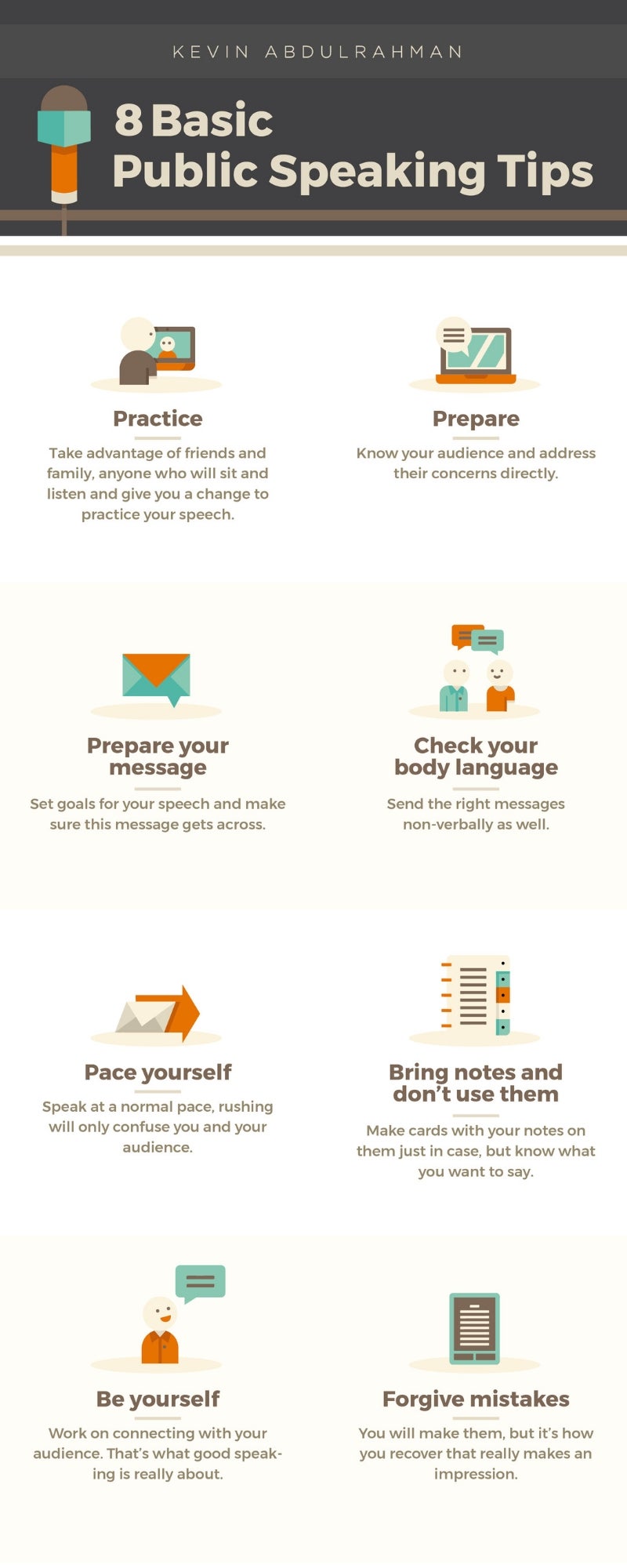Eight Basic Public Speaking Tips If you want to supercharge your professional life, practice these basic tips before you move into more complicated public speaking techniques.
Opinions expressed by Entrepreneur contributors are their own.
You're reading Entrepreneur Middle East, an international franchise of Entrepreneur Media.

You might not like it, but if you want to succeed in business you must be able to speak well in public.
This is a difficult ask. Most people hate public speaking. They find it difficult and stressful, and will actively avoid situations where they might have to do it. This can lead to lost opportunities and regret.
Getting started with public speaking means understanding the basics of the art and applying them every time you get the chance to practice this skill. Public speaking doesn't have to be that difficult. It's a learned skill, like any other, and you will get better through practice. But taking those first few steps is the hardest part. Feeling fear is fine, but giving into fear is never a good thing and not a habit you want to cultivate. Instead, make the decision to work on your weak spot, and gain a skill that could help you in every part of your life. What are you missing out on because of your fear of public speaking? And what opportunities could you have access to if you gain this skill?
1. Practice beforehand
If you're new to public speaking, it will help if you practice before you have to give a speech to a group of strangers. Ask friends or family to watch and critique you, gently. Make sure they know what to look for, including body language problems, your speaking rate, and even issues with the speech itself. Take their criticisms and use them to make your speech better. And keep practicing until you have your performance memorized.
2. Know your audience
Before you face those staring faces, you need to understand who you'll be speaking to. You can't address your audience properly if you don't know who they are, what they're concerned with, and what they want from you. Knowing all of these facts will help you tailor the speech and make it much more effective.
3. Make sure you have a clear message
Sometimes people ramble when they're nervous. They go off topic, they lose their place and start talking at random. If you're prone to this, you probably know how embarrassing this can be, and how much you always regret it later. You can avoid this by having a clear message. This will probably be a reason you want to give the speech, or something specific that you want to teach. Keep this in mind, and it will help to keep you on track.
Related: Five Tips For Public Speaking Like A Pro
4. Check your body language
Your body language can make your audience feel relaxed and included, or uncomfortable and uneasy. (link to body language article) Only twenty percent of our message is conveyed through what we say verbally, while the rest is nonverbal. This means that you need to be aware of what your body is saying. Consistency is key here. If your voice and words are confident but your body language says something else your audience will sense it and you will lose them. Make sure that you stand up straight, with your shoulders back. Use your hands to gesture if you're comfortable doing that. Your expression is also important, so try to smile or at least relax your face. This will all help to relax your audience and give the impression that you're both confident and happy to be there.

Source: Kevin Abdulrahman
5. Pace yourself
Pacing is very important in speaking. You need to be able to speak at a natural rate, with natural pauses between words and sentences. If you speak too fast your words will run together, and it will also increase the chances that you will make a mistake. It might be tempting to speak quickly to finish the speech sooner, but practice speaking at a more normal rate. If you speak too fast, you might overwhelm your audience and diminish the impact of your speech as well. Remember that the audience is trying to understand and learn from you. If you speak too quickly they won't have the time to really hear and understand your words. It will also tell them that you're nervous, and this will color their impressions of your performance.
6. Bring notes, but know your stuff
You should have notes with you. They'll help you feel more secure, give you something to do with your hands, and help you out if the worst happens and your mind goes blank. But don't rely on them too much. Know what you want to say and how you want to say it. Don't be one of those speakers who stares down at their hands and reads in a monotone. This never makes for a good speech.
Related: Don't Wait For A Keynote To Invest In Public Speaking Training
7. Be yourself
This sounds like generic advice that isn't very helpful, but it's actually key to giving a good speech. Speaking to an audience is about connecting with them, and you can't do that if you're trying to be someone you're not. Tell a story or a joke if that's natural for you. Or if you're too nervous for that kind of tactic, just admit that you're nervous. This type of honesty will help your audience feel like they understand you and are connected to you. Creating this kind of connection should be one of the primary goals of your speech.
8. Don't worry about mistakes
You will make mistakes. You'll stumble over a word, forget something, or gesture too awkwardly. When that happens, keep going. Chances are that most of your audience didn't notice, we always think that our mistakes are bigger than they are. And if they did notice it doesn't matter as much as the fact that you recovered well and still delivered your message. Being able to recover is a triumph, and if you understand that your audience will be left with the joy of that feeling.
The number one thing you can take away from this
Public speaking is an essential skill at work and in life. Knowing how to give good speeches can make you stand out at work and perhaps even suggest new projects and paths. It's quite common for people to be afraid of public speaking, but this isn't a reason to avoid practicing this skill. If you want to supercharge your professional life, set clear goals to improve your public speaking and practice these basic tips before you move into more complicated techniques.










